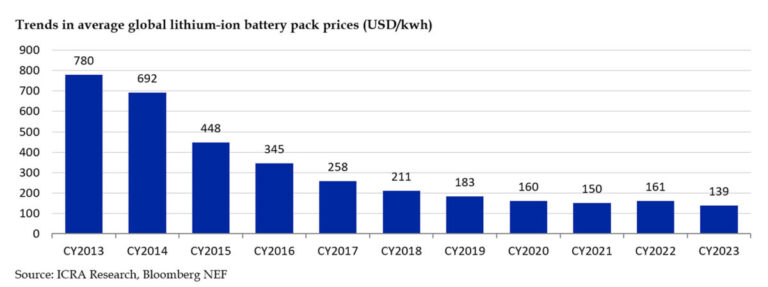Battery prices hit an all-time low in India in 2023, led by a moderation in commodity prices and rising production across the value chain, credit rating agency ICRA said.
ICRA said it expects the recent decline in battery costs to drive adoption of battery energy storage system (BESS) projects in India. BESS and pumped hydro storage projects are now the dominant energy storage options in India.
ICRA said it expects the share of renewable energy generation, including large hydropower plants, to increase to around 40% of national generation by fiscal year 2030, up from less than 25% currently, due to major capacity expansions now underway are in progress. Achieving such a high share would require the development of energy storage systems to manage the variability associated with wind and solar energy.
Energy storage systems also play a role in improving grid stability, by providing ancillary services and peak load shifting. Since the Ministry of Power released bidding guidelines for BESS projects, there have been multiple bids by central nodal agencies and state distribution companies. The rate under these bids is fixed and affordable, based on availability and return efficiency.
“The discovered tariff under the BESS tenders has more than halved from INR 10.84 lakh ($12,987)/MW/month in Solar Energy Corp.’s first tender. of India (SECI) by August 2022 to INR 4.49 lakh/MW/month in the last tender by Gujarat in March 2024, reflecting the fall in battery prices and improvement in competitiveness of such projects,” said Girishkumar Kadam , senior vice president and group head of corporate ratings for ICRA. “The viability of these projects remains dependent on the BESS’s capital costs. Based on the average battery cost of $140/kWh in 2023, together with associated taxes/fees and the cost of the remainder of the installation, capital costs are expected to be between $220/kWh and $230/kWh.”
The decline in battery costs over the past decade through 2021 has helped drive down the cost of energy storage and adoption of BESS projects around the world. While prices rose in 2022, they fell to all-time lows in 2023, led by a moderation in commodity prices. Cheaper battery prices are key to greater adoption of BESS projects, ICRA said.
“The implementation risks and gestation period for the BESS projects remain relatively low compared to PSP-hydro,” Kadam said. “Overall, a sustained reduction in battery prices and a relatively short gestation period for these projects are expected to support their greater adoption for energy storage in the future.”
This content is copyrighted and may not be reused. If you would like to collaborate with us and reuse some of our content, please contact: editors@pv-magazine.com.


